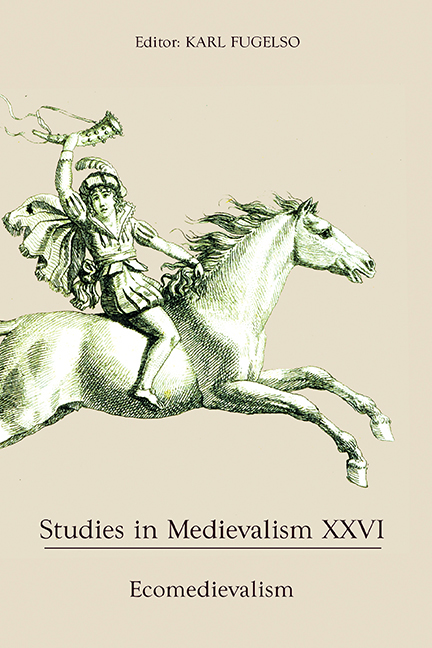Book contents
- Frontmatter
- Studies in Medievalism
- Acknowledgments
- Contents
- List of Illustrations
- Editorial Note
- I Ecomedievalism: Some Perspective(s)
- “A Sense of Life in Things Inert”: The Animistic Figurations in Nineteenth- and Twentieth-Century Medievalist Texts
- Future Nostalgias: Environmental Medievalism and Lanier's Southern Chivalry
- T. H. White's “Forest Sauvage”: Nostalgia and Loss
- Elvencentrism: The Green Medievalism of Tolkien's Elven Realms
- II Interpretations
- Contributors
- Miscellaneous Endmatter
Future Nostalgias: Environmental Medievalism and Lanier's Southern Chivalry
from I - Ecomedievalism: Some Perspective(s)
Published online by Cambridge University Press: 15 September 2017
- Frontmatter
- Studies in Medievalism
- Acknowledgments
- Contents
- List of Illustrations
- Editorial Note
- I Ecomedievalism: Some Perspective(s)
- “A Sense of Life in Things Inert”: The Animistic Figurations in Nineteenth- and Twentieth-Century Medievalist Texts
- Future Nostalgias: Environmental Medievalism and Lanier's Southern Chivalry
- T. H. White's “Forest Sauvage”: Nostalgia and Loss
- Elvencentrism: The Green Medievalism of Tolkien's Elven Realms
- II Interpretations
- Contributors
- Miscellaneous Endmatter
Summary
Both David Matthews, in his study of the history of medievalism, and Katey Castellano, in her study of the origins of environmentalism, cite Edmund Burke's Reflections on the Revolution in France (1790) as an immensely important embryonic moment in the history of these two traditions. In particular, Castellano cites the development of “environmental conservationism” (a right-of-center political movement invested in localizing communities of natural conservation) as a formative reaction to the destruction of an “intergenerational awareness” of the value of social order and the natural environment by nascent capitalism and the French Revolution. Similarly, Matthews traces “a conservative appropriation of [medieval] romance” from Burke's recurring comments on the failure of chivalry to the rise of “romantic medievalism” (conservative, literary reconstructions of the past through the commonly received genre of medieval romance). Though neither environmentalism nor medievalism are monolithic, “environmental conservationism” and “romantic medievalism” are important, foundational subgenres in these diverse movements. Therefore, the extensive liquidation of multi-generational land holdings (and the aristocracy who held those lands) during the French Revolution is a logical historical springboard for both medievalism and environmentalism.
It is not only a common origin in this peculiar historical moment that environmentalism and medievalism share, however. Both were founded, and have been consistently re-imagined, by a deep-seated urge of nostalgia: nostalgia for a world where principles and common sense supposedly prevailed, for a world where humanity supposedly had a closer link with nature, or simply for a time when Progress (with its industrial-capitalist morality) did not advance so quickly. In the following essay, I consider how nostalgia, in its complex presentation of poly-temporal fantasies, formatively links environmentalism and medievalism. After first inviting readers to revisit the chronological and intellectual implications of nostalgia in medieval and environmental studies, I offer a brief reading of Sidney Lanier's early poetry as an important precursor to the current theoretical debates ongoing within these disciplines.
- Type
- Chapter
- Information
- Studies in Medievalism XXVIEcomedievalism, pp. 11 - 20Publisher: Boydell & BrewerPrint publication year: 2017



